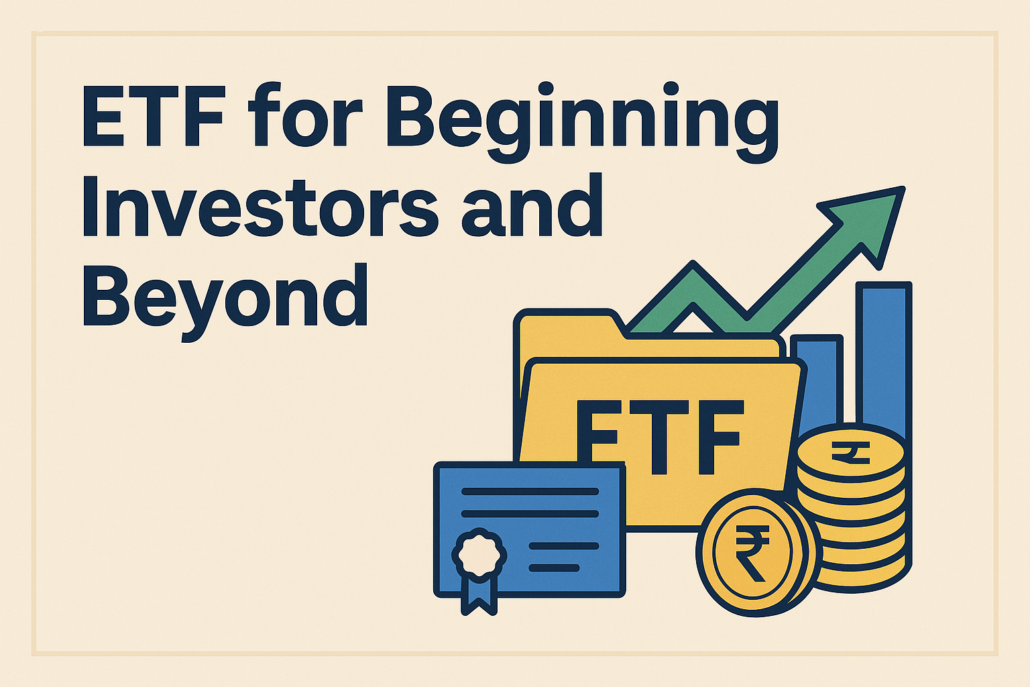ETF for Beginning Investors and Beyond: A Simple Guide to Smarter Investing
Understanding the Buzz: What is an ETF?
An Exchange Traded Fund (ETF) is like a hybrid between a mutual fund and a stock. It pools money from many investors to invest in a basket of assets—stocks, bonds, commodities, or indices—and it trades on the stock exchange just like a regular share.
So, when you buy an ETF, you’re essentially buying a slice of a whole portfolio in one click.
Why ETFs Are Gaining Popularity in India
With SEBI pushing for transparency and passive investing rising, ETFs have caught the eye of retail and institutional investors alike. They’re cost-effective, easy to access, and track indices with precision.
How Do ETFs Work? (In Simple Words)
-
ETFs are listed on stock exchanges.
-
They mirror an index (like Nifty 50, Sensex, Gold price).
-
Their price moves during market hours—just like stocks.
-
You buy/sell ETFs through a demat account via a broker.
💡 ETF = Index Fund + Real-Time Trading
ETF vs Mutual Fund: What’s the Difference?
| Feature | ETFs | Mutual Funds |
|---|---|---|
| Buy/Sell Method | Through Stock Exchange | Through AMC or App |
| NAV Updates | Real-time | Once a day (end of day) |
| Expense Ratio | Lower (0.05%–0.30%) | Higher (0.50%–2.25%) |
| Active vs Passive | Mostly passive | Both active & passive |
| Demat Account | Required | Not required |
Types of ETFs in India
-
Equity ETFs – Track stock indices (Nifty 50, Sensex).
-
Debt ETFs – Track government or PSU bond indices.
-
Gold ETFs – Reflect the price of physical gold.
-
International ETFs – Mirror global indices like Nasdaq.
-
Sectoral/Thematic ETFs – Focused on sectors like banking, IT, etc.
ETF for Beginning Investors: The Perfect Start
If you’re new to investing, ETFs are a great low-cost way to begin:
✅ Easy to understand
✅ Passive (no fund manager bias)
✅ Better transparency
✅ Low entry cost (buy 1 unit and start)
Example:
Let’s say Nifty 50 is at 22,000. You buy 1 unit of Nifty ETF at ₹220 (reflects 1/100th of the index). Your investment now mirrors the index performance.
Top ETFs in India (June 2025)
| ETF Name | Type | AUM | Expense Ratio |
|---|---|---|---|
| Nippon India Nifty BeES | Equity | ₹11,000 Cr+ | 0.05% |
| SBI Nifty 50 ETF | Equity | ₹35,000 Cr+ | 0.07% |
| HDFC Gold ETF | Gold | ₹3,200 Cr | 0.10% |
| ICICI Prudential Bharat Bond ETF | Debt | ₹25,000 Cr+ | 0.06% |
How to Buy ETFs: A Quick Guide
-
Open a demat and trading account with any broker (Zerodha, Groww, Upstox, etc.).
-
Search for the ETF (e.g., Nippon Nifty BeES).
-
Place a market or limit order, just like you would for any stock.
-
Track performance via your broker app or demat holdings.
ETF for Matured Investors: The Premium Edge
For seasoned investors and HNIs, ETFs serve as tactical or long-term passive allocations:
-
Asset Allocation Tool: Mix equity, debt, and gold ETFs to build a diversified core portfolio.
-
Cost Alpha: Avoid high fees of active funds.
-
Strategic Bets: Use thematic ETFs (e.g., PSU Bank ETF) when bullish on a sector.
📌 Example: A ₹50 lakh corpus can be allocated:
-
40% in Nifty 50 ETF
-
30% in Bharat Bond ETF
-
20% in Gold ETF
-
10% in Nasdaq ETF (for global exposure)
Taxation of ETFs in India
| ETF Type | Holding Period | Tax Type | Rate |
|---|---|---|---|
| Equity ETFs | >12 months | LTCG | 10% over ₹1L |
| Gold/Debt ETFs | >36 months | LTCG | 20% with indexation |
💡 Short-term gains are taxed as per your income slab.
Common Myths Around ETFs – Busted!
❌ ETFs are only for experts.
✅ Nope. They’re simpler than most mutual funds.
❌ You need a lot of money.
✅ One unit can cost as low as ₹50–₹500.
❌ ETFs don’t give good returns.
✅ Nifty ETF has delivered 12–14% CAGR over 10+ years.
Who Should Invest in ETFs?
-
First-time investors who want index returns at low cost.
-
Salaried professionals for long-term passive wealth building.
-
Retirees seeking low-risk options like debt ETFs.
-
HNIs for large diversified portfolios with global ETFs.
Pro Tips to Maximize ETF Investing
✅ Don’t chase returns—choose index-backed ETFs.
✅ Rebalance yearly—keep allocation in check.
✅ Use SIP in ETFs through stock brokers if available.
✅ Check tracking error and liquidity before buying.
Conclusion: Are ETFs Worth It?
Absolutely. ETFs offer a smart, cost-effective, and transparent route to wealth creation—whether you’re a college student just starting out or a matured investor managing crores.
It’s time to ditch guesswork and go passive with ETFs. The market may move up or down, but the index always wins in the long run.
![]()



